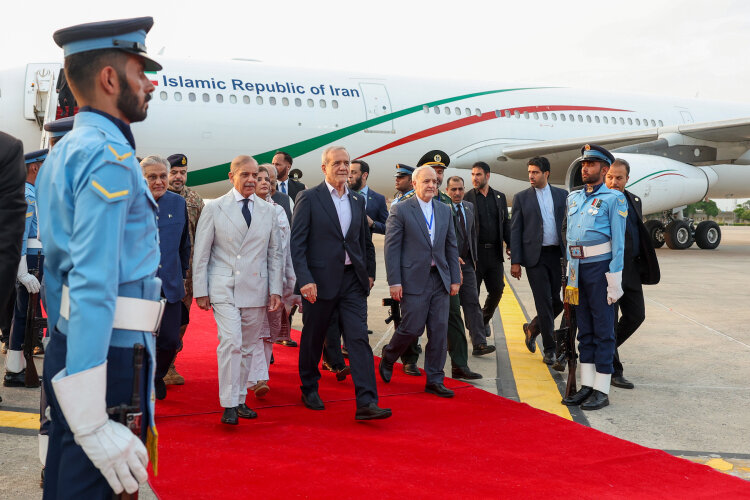‘Partners in shaping a shared future’
Pezeshkian’s visit to Pakistan marks new era of cooperation and unity

TEHRAN – As Iran’s President Masoud Pezeshkian commenced his two-day official visit to Pakistan on Saturday, Iranian Foreign Minister Abbas Araghchi described Tehran and Islamabad as “partners in shaping a shared future” in an article published ahead of the trip.
President Pezeshkian’s visit, conducted at the invitation of Prime Minister Shehbaz Sharif, reflects growing momentum in Tehran-Islamabad ties, following a series of high-level exchanges, including the late President Ebrahim Raisi’s landmark visit to Islamabad and Prime Minister Shehbaz Sharif’s trip to Tehran.
Honoring Iqbal: a symbolic start in Lahore
Pezeshkian’s arrival in Lahore, where he paid tribute to the philosopher and poet Muhammad Iqbal at his mausoleum, was a symbolic start to the trip.
The gesture underscored Iran’s emphasis on cultural and ideological ties with Pakistan. Iqbal, a revered figure in both countries, represents a bridge between Persian and South Asian Islamic thought.
President Pezeshkian also signed the official memorial book at the tomb, leaving a message of shared historical and civilizational identity.
Nawaz Sharif praises Iran’s resistance, reaffirms brotherhood
In Lahore, President Pezeshkian also held a brief meeting with Muhammad Nawaz Sharif, the leader of the Pakistan Muslim League. Nawaz Sharif used the opportunity to praise Iran’s stance and the Iranian people’s resilience in the face of Israeli aggression.
He said that the Iranian people had not only defended their country but had projected “a renewed and dignified image” of Iran. Describing Iran’s resistance as “a courageous confrontation with global powers,” Nawaz Sharif emphasized that in Pakistan, such steadfastness is seen as a source of honor. He added that his presence at the airport to personally welcome President Pezeshkian was intended to acknowledge this “great resilience.” Stressing fraternal ties, he stated, “Pakistan is not just a neighbor but a brother to the Islamic Republic of Iran.”
President Pezeshkian expressed gratitude for the support shown by the Pakistani people and authorities. Echoing the theme of unity, he stated that if Muslims around the world were united, the Zionist regime would no longer be able to target independent nations one by one. He urged the Muslim world to share scientific, industrial, and agricultural capacities and to form a unified bloc to meet the needs of the Islamic Ummah.
Following the cultural and symbolic engagements in Lahore, Pezeshkian proceeded to Islamabad, where meetings are scheduled with senior Pakistani officials.
Pezeshkian thanks Pakistan for support during US-Israeli aggression
In remarks delivered prior to the visit, Pezeshkian pointed out that Pakistan has consistently condemned Israeli and the U.S. aggression against Iran, including at the parliamentary level, and has expressed readiness to support Iran’s territorial integrity. He praised Pakistan’s principled positions, particularly in light of regional instability and external pressure.
Economically, Pezeshkian emphasized that the trip aimed to expand trade and commercial cooperation, setting an ambitious target of increasing bilateral trade to $10 billion. He highlighted border markets, air and maritime links, and Iran’s interest in integrating into the China-Pakistan Economic Corridor (CPEC) as areas of opportunity. Pezeshkian underlined the importance of connectivity between Iran and Pakistan and expressed optimism that Iran could link to Europe through the CPEC network.
He also stressed the importance of border security and regional stability, describing them as essential concerns for both countries. He pledged efforts to coordinate closely with Pakistani counterparts to ensure sustainable security in the region, and once again reiterated that Islamic unity was key to preventing further regional fragmentation. Pezeshkian concluded by stating that hostile actors were actively working to divide Islamic nations, and that Tehran and Islamabad must work together to reinforce cohesion and solidarity.
‘A strategic bond rooted in history’, Foreign Minister Araghchi hails Iran, Pakistan ties
Ahead of the visit, Foreign Minister Abbas Araghchi authored an article titled “A Shared Future”, in which he noted Iran-Pakistan relations as a strategic partnership, not just a product of geographic proximity, but one grounded in history, religion, and common purpose.
He wrote that Iran’s foreign policy centers on fostering stable and mutually beneficial ties with neighbors, with Pakistan holding a special place due to the two countries’ deep-rooted historical, cultural, and religious bonds.
Araghchi emphasized that Iran and Pakistan are sovereign Muslim nations capable of shaping the future of the region, and that their shared values—justice, compassion, and solidarity—guide their common stance on international issues, particularly the Palestinian cause. He highlighted Pakistan’s condemnation of the June 2025 Israeli and U.S. military strikes on Iranian soil, calling the public support shown by the Pakistani people “deeply moving” and unforgettable.
From an economic perspective, Araghchi stressed the complementary strengths of both economies—Iran’s energy resources and Pakistan’s agricultural base—as a foundation for long-term cooperation. He advocated for practical trade and transit corridors, which could, he argued, yield tangible economic benefits and support the development of a fair, open regional economy.
In the area of security cooperation, Araghchi noted the alignment between Tehran and Islamabad in combating terrorism and extremism, while also calling for institutional mechanisms and long-term planning to turn shared aspirations into action. He pointed to joint work in international organizations such as the UN, OIC, SCO, and D-8, describing these as platforms through which Iran and Pakistan pursue shared goals of connectivity and integration.
In conclusion, Araghchi wrote that unity, mutual respect, and cooperation between the two nations would serve as the basis for lasting peace and shared prosperity.
Leave a Comment